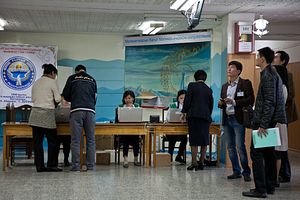Kyrgyzstan’s Central Election Commission released the final results of the parliamentary elections held on October 4. The final results closely mirror the preliminary results with the Social Democratic Party (SDPK) coming out on top, capturing 27.56 percent of the votes and receiving 38 seats in the 120-member parliament.
Respublika-Ata-Jurt–formed by the merging of Respublika and Ata-Jurt, which had both held seats in the previous parliament–pulled 20.26 percent of the national vote and will received 28 seats. Kyrgyzstan–a new party with an unimaginative, but recognizable, name–won 13.07 percent of the votes and will seat 18 deputies. Onuguu-Progress, Bir Bol, and Ata-Meken recieved 9.39, 8.59, and 7.08 percent of the vote respectively and will seat 13,12, and 11 members in the new parliament.
Parties needed to poll nationally above 7 percent, as well receive at least 0.7 percent of the votes in each of Kyrgyzstan’s 7 regions, plus its two largest cities–Bishkek and Osh. Ata-Meken, which held 18 seats in the previous parliament just barely made the threshold.
While the results are final–who precisely will enter parliament as well as which parties will make up the ruling coalition and which will sit in opposition are unknown.
24.kg reported last week that party leaders were in the process of reshuffling the party lists. Prior to the election, parties had to submit numbered lists–adhering to specific guidelines relating to gender, minorities and disabilities.
Akipress kept track of how many were dropped from each party’s list. SDPK dropped 3 members and Onuguu-Progress 5. But Respublika-Ata-Jurt dropped 70, of the presumably 120 names, on its party list.
Eurasianet honed in on Djoomart Otorbayev, who apparently personally requested to be dropped from Ata-Meken’s list:
One such prominent figure was Djoomart Otorbayev, who resigned as prime minister in April and ran in fifth place on the Ata-Meken party list. The speculation is that Otorbayev may have fallen on his sword after failing to boost the party’s performance in the Kemin district in northern Kyrgyzstan, where he had been expected to rally support.
Otorbayev had been thought to be a potential shot for the presidential election in 2017, but his prospects look to have been weakened.
As the dust settles the next step will be building a majority coalition. But as Eurasianet put it “with the economy in the state that it’s in, there may be strong competition for staying out of the fray.”
Tacking Kyrgyzstan’s many challenges will be daunting task indeed for the entire parliament. But those in majority coalition will be politically liable for how things develop–regardless of whether they have much actual control. With presidential elections scheduled for 2017, individual politicians eyeing the top seat may be more willing to sit on the sidelines of parliament for the time being and forgo taking on the responsibility of solving an extremely difficult set of problems. Then again, now is the time for Central Asia’s only democratically-elected and politically-diverse parliament to prove its worth.

































